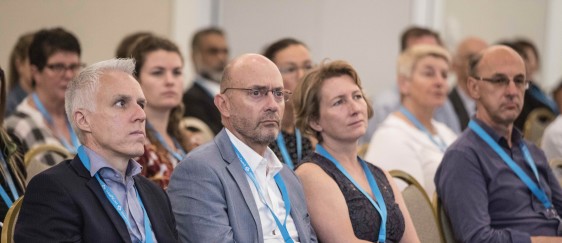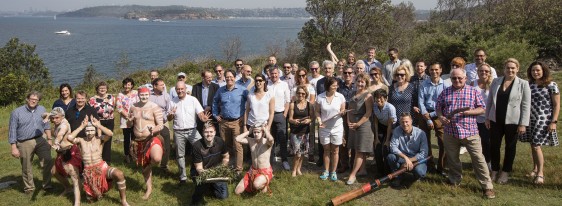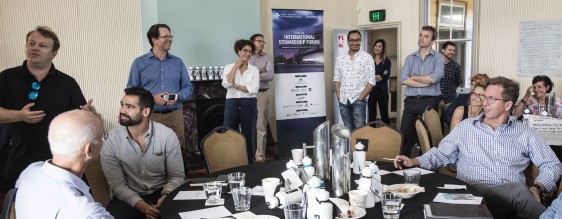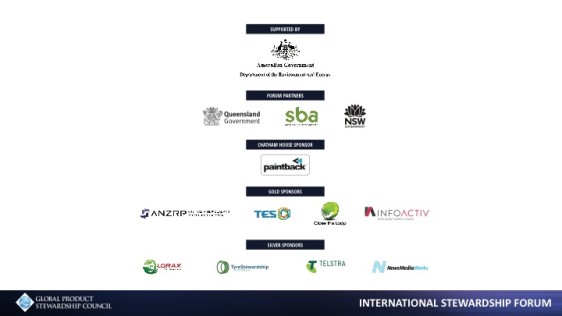GlobalPSC News – April 2018
International Stewardship Forum

In early April, the GlobalPSC convened the inaugural International Stewardship Forum in Sydney. With over 130 participants and speakers based in nine countries, the Forum provided a unique opportunity for participants to gather practical insights from product stewardship and extended producer responsibility (EPR) programs across a broad range of products and substances. The Forum was designed and structured to help inform the Australian Government’s 2018 review of the Product Stewardship Act 2011.
Activities began with site visits for international speakers and Forum sponsors of innovative waste electrical and electronic equipment (WEEE) processing technologies. In addition to touring TES Australia and New Zealand’s Sydney WEEE reprocessing site, we toured the world’s first small, modular recycling plant “microfactories” developed by the University of NSW’s Centre for Sustainable Materials Research and Technology (SMaRT) the day prior to their official launch. The microfactories are capable of breaking down WEEE into products like metal alloys, nanoparticles for industrial-grade ceramics and filaments for 3D printing.
The Forum was designed to maximise discussion and interaction between local and international representatives, and involved two days of presentations and panel discussions. Presentations have been made available to participants through the event app and are being uploaded to the Knowledge Base available to GlobalPSC members via the Members Page.
A final day of discussions with select stakeholders reflected upon the Forum presentations, identified key insights, and helped map out a way forward for product stewardship in Australia. These invitation-only discussions followed a modified Chatham House Rule to encourage openness and information sharing at a historic site on Sydney Harbour, while incorporating traditional Aboriginal ceremonies and a networking reception aboard a tall ship.


An Issues and Options Paper capturing the Forum and Chatham House discussions is being reviewed and will be made available to GlobalPSC members and Forum participants in the near future once the review is complete.
We’d like to extend special thanks to all the supporters and sponsors that not only made the Forum possible, but helped create such a strong model for future events. The GlobalPSC has already been in discussions with regional partners about holding future Forums in Europe and Australia, with other regions also under consideration. Contact us to be informed of future events.

Implementation of 2018 Open Scope WEEE

The EU WEEE Directive (Directive 2012/19/EU) introduced a number of changes to the original Directive (Directive 2002/96/EC), including an “Open Scope” of 6 revised categories instead of the previous 10, which according to the Directive are to be introduced from 15 August 2018. The Waste Electrical and Electronic Equipment Directive, which was made an EU law in February 2003, was instituted to set collection, recycling and recovery targets for electrical goods. The Directive sets the foundations for the creation of collection/compliance schemes. The aim of the schemes is to ensure that WEEE is collected and reused or recycled.
The six new categories to be introduced are:
- Temperature exchange equipment: fridges, freezers, air conditioning, etc.
- Screens, monitors, and equipment containing screens having a surface greater than 100 cm2: TVs, computer monitors, etc.
- Lamps
- Large equipment (any external dimension more than 50cm): washing machines, dish washers, cookers, luminaires, large printers, copying equipment in general, etc.
- Small equipment (no external dimension more than 50cm): vacuum cleaners, calculators, video cameras, cameras, hifi equipment, watches and clocks, smoke detectors, payment systems, etc.
- Small IT and telecommunication equipment (no external dimension more than 50 cm): mobile phones, tablets, routers, laptops, GPS, printers, etc.
For more information, click here.
Packaging EPR Regulation in Mozambique
Mozambique’s Decree 79/2017, of 28 December 2017, approving the Regulation on the Extended Responsibility of Producers and Importers of Packaging, was approved by the Council of Ministers and came into force on 29th December 2017. The Regulation applies to all public and private entities, natural or legal persons engaged in the production, import and management of packaging to increase their responsibility in order to safeguard the environment and public health.
All packaging is obligated under this regulation including commercial and domestic packaging and the packaging waste produced. The Ministry for the Environment is responsible for drafting and disclosure of rules and procedures in the context of the production and import of packaging and packaging waste. The Ministry for Industry and Commerce is responsible for establishing rules and standards applicable to import and production of packaging. Furthermore, under the Regulation, the Ministry for Finance is responsible for the collection of fees and fines as well as the supervision of the rules applicable to packaging in the context of clearance goods.
Producers and importers of packaging and packaging waste are responsible for the management of packaging and packaging waste, pursuant to the Regulation and other applicable legislation; the payment of fees for the management of packaging and the return and recovery of packaging waste, whether directly or through organisations created for waste recovery.
Further detail is in the Knowledge Base available to GlobalPSC members via the Members Page. Analysis provided by GlobalPSC Corporate Members Lorax Compliance.
Share
-
Member News, Member Profiles, News
New GlobalPSC Member – Foundation for Ethical Recycling of Industrial Scrap
-
Member News, News
Annual General Meeting and Call for Office-holders and other Executive Committee Positions
-
Events, Member News, News
Towards a Circular Economy Through Stewardship of Forestry Residues

